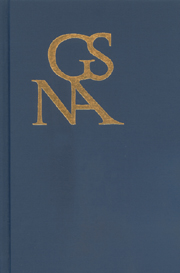Book contents
- Frontmatter
- Contents
- Special Section on Goethe and Idealism
- Introduction—Goethe and Idealism: Points of Intersection
- Goethe and Spinoza: A Reconsideration
- Goethean Intuitions
- Goethe's Notion of an Intuitive Power of Judgment
- “Idealism is nothing but genuine empiricism”: Novalis, Goethe, and the Ideal of Romantic Science
- The Quest for the Seeds of Eternal Growth: Goethe and Humboldt's Presentation of Nature
- Hegel's Faust
- Goethe contra Hegel: The Question of the End of Art
- Goethean Morphology, Hegelian Science: Affinities and Transformations
- Die Gretchenfrage: Goethe and Philosophies of Religion around 1800
- Civic Attachments & Sibling Attractions: The Shadows of Fraternity
- Margarete-Ariadne: Faust's Labyrinth
- Save the Prinz: Schiller's Geisterseher and the Lure of Entertainment
- Walsers Trilogie der Leidenschaft: Eine Analyse seines Goethe-Romans Ein liebender Mann im Kontext der Tradition der Ulrike-Romane
- Review Essay: What's New in the New Economic Criticism
- Book Reviews
Hegel's Faust
from Special Section on Goethe and Idealism
Published online by Cambridge University Press: 05 February 2013
- Frontmatter
- Contents
- Special Section on Goethe and Idealism
- Introduction—Goethe and Idealism: Points of Intersection
- Goethe and Spinoza: A Reconsideration
- Goethean Intuitions
- Goethe's Notion of an Intuitive Power of Judgment
- “Idealism is nothing but genuine empiricism”: Novalis, Goethe, and the Ideal of Romantic Science
- The Quest for the Seeds of Eternal Growth: Goethe and Humboldt's Presentation of Nature
- Hegel's Faust
- Goethe contra Hegel: The Question of the End of Art
- Goethean Morphology, Hegelian Science: Affinities and Transformations
- Die Gretchenfrage: Goethe and Philosophies of Religion around 1800
- Civic Attachments & Sibling Attractions: The Shadows of Fraternity
- Margarete-Ariadne: Faust's Labyrinth
- Save the Prinz: Schiller's Geisterseher and the Lure of Entertainment
- Walsers Trilogie der Leidenschaft: Eine Analyse seines Goethe-Romans Ein liebender Mann im Kontext der Tradition der Ulrike-Romane
- Review Essay: What's New in the New Economic Criticism
- Book Reviews
Summary
IN ONE OF THE MOST AUDACIOUS yet widely accepted incursions of philosophy into the literary field, a long line of Faust criticism insists on an analogy between the role of negation in Goethe's drama and in the first masterpiece of the great dialectician Hegel. In this assessment, repeated by such eminent thinkers as Georg Lukács, Ernst Bloch, and Karl Löwith, Faust travels through ever-wider fields of activity that parallel the step-by-step development familiar to readers of the Phänomenologie des Geistes. Faust's ascension to heaven at the end of Faust II would indicate a divine blessing of this journey that marks the successful Bildung of a subject who finally finds himself. In this article I argue that the interpretive logic of this school of Faust criticism has its unacknowledged model in Hegel's own citation of the drama in the Phänomenologie des Geistes. Engaging Hegel's appropriation thus makes an important contribution to our understanding of its role in the drama's reception history. At the same time, the very process of explicating this model reveals an important contrast between the type of negation staged in Faust, which leaves its victims exposed, and the type described in the Phänomenologie, which processes the injuries of spirit as stages in the emergence of a reflective subject.
A brief sketch of the Hegelian line of criticism from its idealist to materialist incarnations allows us to see what is at stake in the way it links negation and violence in Faust.
- Type
- Chapter
- Information
- Goethe Yearbook 18 , pp. 115 - 126Publisher: Boydell & BrewerPrint publication year: 2011

